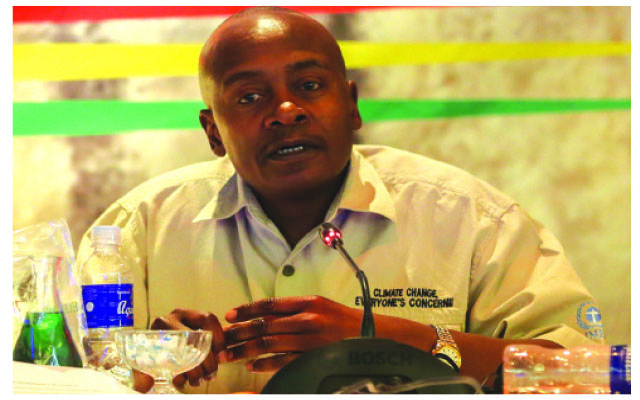Zhakata aims for swift implementation of climate plan. . . new law to enforce compliance


Washington Zhakata
Jeffrey Gogo Climate
ZIMBABWE has started to develop a blueprint for implementing its climate plan for reducing greenhouse gas emissions drawn up two years back under the Paris Agreement on climate change with support from the World Bank and the Russian government.
Also, Government is now four months into formulating a law that will compel companies and municipalities to cut emissions and report these transparently every year, according to Washington Zhakata, climate change director in the Environment, Water and Climate Ministry.
An implementation committee headed by the Office of the President has been set-up, as well a multi-stakeholder technical committee, to design and oversee implementation of the climate plan across industry and across Government, Zhakata told the Herald Business in an interview last week.
“The statutory instrument will guide industry on mandatory reporting of greenhouse gas emissions in a transparent manner, access to data, licensing for climate smart technologies and others,” he said, by phone.
“In order for the country to comply (with terms of the Paris Agreement) it should be supported by law that will assist to enforce some of the provisions of the climate treaty.”
The law is expected to come into effect by year-end, said Zhakata.
Zimbabwe on September 6 ratified the Paris Agreement on climate change – meaning it is now bound by the terms of the accord – and three months ago concluded a National Climate Policy aimed at integrating climate change into national priorities of economic growth, employment and poverty reduction.
The Paris treaty was agreed by almost 200 world governments in France in 2015.
The accord aims to curb global temperature rise by “well below two degrees Celsius” by mid-Century, and to deliver $100 billion each year to help poor nations cope with climate change.
Every government party to the Agreement is expected to play its part in achieving those targets.
Under its Nationally Determined Contributions (NDCs) – Paris’ building blocks – Zimbabwe aims to cut its total emissions of 27 million kg of carbon dioxide equivalent by over a third by 2030, mostly by increasing investment in hydro-power and solar power and improving energy efficiency.
To do this, the country immediately needs $7,1 billion, which rises to over $55 billion over the next 15 years, according to its climate plan under the Paris treaty.
Government has undertaken to meet only a fraction of the costs. Rich countries are expected to provide the bulk of he funding, as agreed under the climate treaty.
Now, one of the most crucial aspects of the global accord is to make sure countries make good on their pledges, and that they aren’t just selling hot air.
This process of verification will begin a few years from now, and will determine whether the world was making any quantifiable progress at all towards meeting the goals set out at Paris.
It is in this respect that the proposed new law comes in handy.
Zhakata said the law mostly targets those companies in the energy and waste sectors, which will be expected to report to the Climate Ministry their emissions from the previous year by March 31 of the following year.
Energy is the largest polluting sector in Zimbabwe, accounting for 49 percent of the national emissions total, figures from the Climate Ministry show. At 6 percent, the waste sector makes up the smallest.
“Global warming potential is very high in those sectors,” warned Zhakata, Zimbabwe’s climate change director.
He said his Ministry was “developing an implementation framework for NDCs with particular reference on measurement, reporting and verification” with technical and financial support from the World Bank.
The Russian government has also released $1 million towards the project, says Zhakata.
Changing landscape
Until now, it was a free for all; companies were under no obligation to report their carbon emissions.
What we know about Zimbabwe’s rate of emissions is based on data collected or gleaned from reports on a sector by sector basis, which can be both inefficient and misleading.
Perhaps this partly explains why the latest figures we have on emissions are as archaic as 17 years ago.
A lot of changes have happened across the economy since 2000, when the last emissions inventory was taken, that may have shaped Zimbabwe’s greenhouse gas emissions either positively or negatively.
The proposed Nationally Determined Contributions law, which will ride on the existing Environmental Management Act, seeks to put an end to such distortions.
By forcing individual companies to implement verifiable strategies that limit carbon emissions, Government authorities hope to improve accountability, efficiency and transparency in emissions data collection and reporting.
“This (the law) enables us to track whether companies are abiding to what they would have put on the table,” said Mr Zhakata, adding that the ultimate goal “was not to come up with punitive measures for failure to comply, but to incentivise companies to go green.
He said the company emissions reporting plan was part of a broader national strategy “to develop methodologies to monitor emissions for self-assessment in a transparent manner” and to avoid defaulting on the Paris Agreement.
With the National Climate Policy now waiting to be launched by President Mugabe, further effort is now required to achieve full integration of the NDCs “into budgeting and operational processes beyond an integration ‘on paper’. “
The next step, one that may prove more difficult than enacting the plan, is funding its implementation.
Zhakata didn’t sound convincing when asked whether Zimbabwe had a clear and precise idea of where that money would come from.
“We are introducing the stakeholders to the various technologies, funding windows including the GCF private funding facility, partnerships with other institutions, etc,” he said, by text message.
“We are encouraging industries to work within the framework of their developmental and strategies in order not to constrain our development pathway.”
God is faithful.










Comments